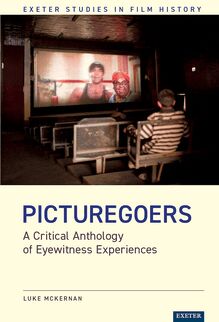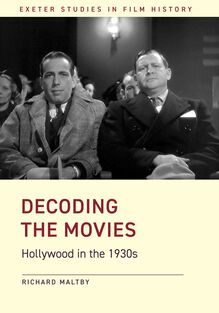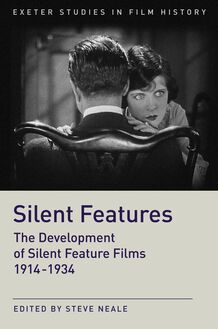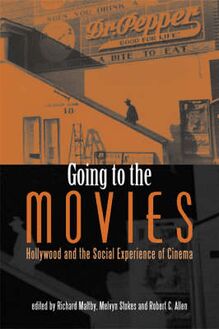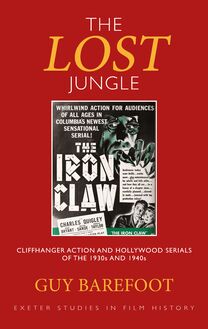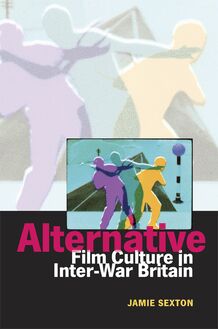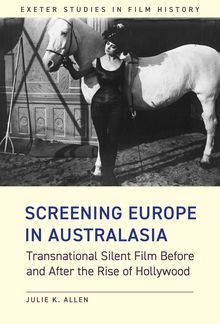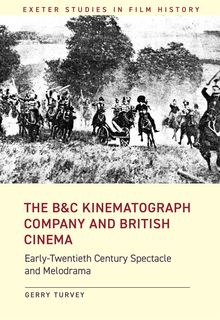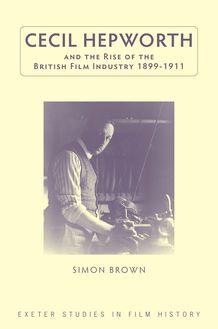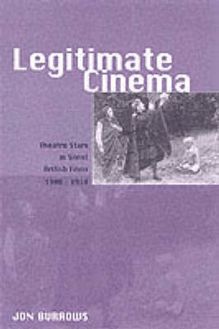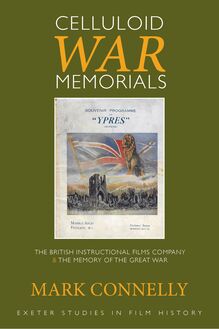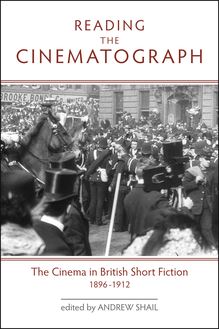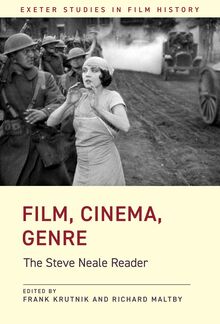The Appreciation of Film , livre ebook
159
pages
English
Ebooks
2019
Vous pourrez modifier la taille du texte de cet ouvrage
Obtenez un accès à la bibliothèque pour le consulter en ligne En savoir plus
Découvre YouScribe en t'inscrivant gratuitement
Découvre YouScribe en t'inscrivant gratuitement
159
pages
English
Ebooks
2019
Vous pourrez modifier la taille du texte de cet ouvrage
Obtenez un accès à la bibliothèque pour le consulter en ligne En savoir plus
Publié par
Date de parution
31 juillet 2019
Nombre de lectures
1
EAN13
9780859899895
Langue
English
This book offers the first full account of the film society movement in Britain and its contribution to post-World War Two film culture. It brings to life a lost history of alternative film exhibition and challenges the general assumption that the study of film began with university courses on ‘Film Studies’.
Showing how film societies operated and the lasting impression they made on film culture, The Appreciation of Film details the history of film education in Britain. The book illuminates the changing relationship between volunteer-run societies and professionalised agencies promoting film art such as festivals, specialist commercial distributors and public bodies such as the British Film Institute.
Drawing on original archival research and oral history interviews the book acknowledges the vigour and dedication of volunteer film society activists and presents contemporary readers with a record of their achievement.
Written in an accessible style, this is a study of 16mm projectors, associational life and the making of film culture in Britain. It reclaims the marginalised civic cinephilia of volunteer film society activists whilst providing an alternative narrative of the emergence of film study in Britain.
List of Illustrations
Acknowledgments
Introduction
1 Enthusiasm and Civic Duty: The Emergence of the Film Society Movement
2 The Postwar Transformation of the Film Society Movement
3 Popularising Film Appreciation: Roger Manvell’s Film
4 The British Film Institute, the Film Archive and Film Society Programming
5 Making the World Our Home: Affirmative Internationalism and Film Societies
6 Film Society Criticism, Middlebrow Taste and New Cinemas
7 Film Societies, Universities and the Emergence of Film Studies
Conclusion: What Was Film Appreciation?
Notes
Bibliography
Index
Publié par
Date de parution
31 juillet 2019
Nombre de lectures
1
EAN13
9780859899895
Langue
English
THE APPRECIATION OF FILM
The Appreciation of Film offers the first full account of the film society movement in Britain and its contribution to post-World War Two film culture. It brings to life a lost history of alternative film exhibition and challenges the general assumption that the study of film began with university courses on ‘Film Studies’. Showing how film societies operated and the lasting impression they made on film culture, the book details the history of film education in Britain.
Richard MacDonald illuminates the changing relationship between volunteer-run societies and professionalised agencies promoting film art such as festivals, specialist commercial distributors and public bodies such as the British Film Institute. Drawing on original archival research and oral history interviews he acknowledges the vigour and dedication of volunteer film society activists and presents contemporary readers with a record of their achievement.
Written in an accessible style, this is a study of 16mm projectors, associational life and the making of film culture in Britain. It reclaims the marginalised civic cinephilia of volunteer film society activists whilst providing an alternative narrative of the emergence of film study in Britain.
Richard Lowell MacDonald is a lecturer in the Media and Communications department at Goldsmiths, University of London. His published research explores the social practices and technological infrastructures that shape the circulation of moving and still images.
Exeter Studies in Film History
Published by University of Exeter Press in association with the Bill Douglas Centre for the History of Cinema and Popular Culture.
Series Editors : Richard Maltby , Professor of Screen Studies, Flinders University, South Australia and Steve Neale , Professor of Film Studies and Academic Director of the Bill Douglas Centre, University of Exeter.
Parallel Tracks: The Railroad and Silent Cinema , Lynne Kirby (1997)
The World According to Hollywood, 1918–1939 , Ruth Vasey (1997)
‘Film Europe’ and ‘Film America’: Cinema, Commerce and Cultural Exchange 1920–1939
edited by Andrew Higson and Richard Maltby (1999)
A Paul Rotha Reader , edited by Duncan Petrie and Robert Kruger (1999)
A Chorus of Raspberries: British Film Comedy 1929–1939 , David Sutton (2000)
The Great Art of Light and Shadow: Archaeology of the Cinema , Laurent Mannoni, translated by Richard Crangle (2000)
Popular Filmgoing in 1930s Britain: A Choice of Pleasures , John Sedgwick (2000)
Alternative Empires: European Modernist Cinemas and Cultures of Imperialism , Martin Stollery (2000)
Hollywood, Westerns and the 1930s: The Lost Trail , Peter Stanfield (2001)
Young and Innocent? The Cinema in Britain 1896–1930 , edited by Andrew Higson (2002)
Legitimate Cinema: Theatre Stars in Silent British Films 1908–1918 , Jon Burrows (2003)
The Big Show: British Cinema Culture in the Great War (1914–1918) , Michael Hammond (2006)
Multimedia Histories: From the Magic Lantern to the Internet , edited by James Lyons and John Plunkett (2007)
Going to the Movies: Hollywood and the Social Experience of Cinema , edited by Richard Maltby, Melvyn Stokes and Robert C. Allen (2007)
Alternative Film Culture in Inter-War Britain , Jamie Sexton (2008)
Marketing Modernity: Victorian Popular Shows and Early Cinema , Joe Kember (2009)
British Cinema and Middlebrow Culture in the Interwar Years , Lawrence Napper (2009)
Reading the Cinematograph: The Cinema in British Short Fiction 1896–1912 , edited by Andrew Shail (2010)
Charles Urban: Pioneering the Non-fiction Film in Britain and America, 1897–1925 , Luke McKernan (2013)
Cecil Hepworth and the Rise of the British Film Industry, 1899–1911 , Simon Brown (2016)
University of Exeter Press also publishes the celebrated five-volume series looking at the early years of English cinema, all reissued in paperback editions in 2014: The Beginnings of the Cinema in England , by John Barnes.
First published in 2016 by University of Exeter Press Reed Hall, Streatham Drive Exeter EX4 4QR UK www.exeterpress.co.uk
© Richard Lowell MacDonald 2016
The right of Richard Lowell MacDonald to be identified as the author of this work has been asserted by him in accordance with the Copyright, Designs and Patents Act 1988.
British Library Cataloguing in Publication Data A catalogue record for this book is available from the British Library.
ISBN 978 0 85989 888 1 Hardback
ISBN 978 0 85989 989 5 epub
ISBN 978 0 85989 972 7 PDF
Typeset by Carnegie Book Production, Lancaster
For my parents, Mike and Joan
Contents
List of Illustrations
Acknowledgements
Introduction
1 Enthusiasm and Civic Duty: The Emergence of the Film Society Movement
2 The Post-war Transformation of the Film Society Movement
3 Popularising Film Appreciation: Roger Manvell’s Film
4 The British Film Institute, the Film Archive and Film Society Programming
5 Making the World our Home: Affirmative Internationalism and Film Societies
6 Film Society Criticism, Middlebrow Taste and New Cinemas
7 Film Societies, Universities and the Emergence of Film Studies
Conclusion: What was Film Appreciation?
Notes
Bibliography
Index
Illustrations
1. Manchester and Salford Film Society, 1931 ‘Storm Over Asia’, handbill (Working Class Movement Library used with the kind permission of the Manchester and Salford Film Society)
2. Manchester and Salford Workers’ Film Society, 1931, Futurist Cinema, Guest Ticket (Working Class Movement Library used with the kind permission of the Manchester and Salford Film Society)
3. Leeds Jewish Film Group Cabaret and Dance Invitation Card (Alec Baron Archive, Leeds University Special Collections)
4. The Workers’ Film Society (Leeds), prospectus, 1935 (Alec Baron Archive, Leeds University Special Collections)
5. Front cover of the first edition of Roger Manvell’s Film published by Penguin Books in 1944
6. Advert for Contemporary Films Ltd from Sight and Sound , Spring 1957
7. British Federation of Film Societies, Autumn Viewing Sessions, 1969
8. Film (British Federation of Film Societies) Autumn 1963 edited by Peter Armitage with layout by Ivor Kamlish
Acknowledgements
Many years ago I was passing the time flicking through old copies of the eclectic and diverting film magazine Films and Filming . Across several issues I followed the thread of a column featuring news of film society screenings around the country, and was surprised to discover that a film society showing Buñuel and Kurosawa on 16mm projectors had met regularly at the primary school where I had been a pupil a decade or so later. This was my introduction to the film society movement. A deeper acquaintance came through the many people I met who generously shared their memories and experiences of being involved in film societies from the 1940s to the present, passed on programmes and magazines from their personal collections and extended warm hospitality to me. For their kindness and assistance I wish to record my gratitude to Sylvia and Peter Bradford, Sid Brooks, Gwen Bryanston, Anne Burrows, Percy Childs, James Clark, Brian Clay, Michael Essex-Lopresti, Denis Forman, Leslie Hardcastle, Alan Howden, David Meeker, John and Doris Minchinton, Gwen Molloy, Victor Perkins, Rommi Przibram, Mansel Stimpson, Mike Taylor, John Turner, Jean Young and Dave Watterson. I owe a special debt of gratitude to the late John Salisbury.
Some sections of Chapters 3 and 5 appear in different versions in articles published in The Canadian Journal of Film Studies and The Journal of British Cinema and Television respectively. In both cases I’m grateful to the anonymous reviewers and the editors. Special thanks are owed to the many colleagues and friends who provided support, encouragement, employment, comment, advice and conversation during the course of the research and since: Ian Craven, Natalie Fenton, Jon Hoare, David Morley, Geoffrey Nowell-Smith, Melanie Selfe, Cris Shore, Gareth Stanton, Martin Stollery and Martin Williams. Thanks also to the examiners of the PhD thesis upon which this book is based, Ian Christie and Jamie Sexton, and to Sean Delaney and Peter Todd at the British Film Institute Library and Information Services. For helping me navigate the long lean years of research I am indebted to Rachel Moore, who loves film and the movies more completely than anyone else I know. Above all, I want to thank the person from whom I have learnt the most, May Ingawanij, for all the fun and games along the way.
Introduction
This book looks back to a period when amateur initiative channelled and cultivated by film societies was a significant force in the making of film culture in Britain. Film societies were not-for-profit voluntary associations that used the subscriptions of their members to pursue objectives that typically included the exhibition of films that were difficult to access through commercial channels and the organisation of educational activities such as lectures, study and discussion meetings and exhibitions.
The first film society in Britain was established in London in 1925 by an actor, Hugh Miller, and Cambridge graduate Ivor Montagu, both of whom were more than usually knowledgeable about developments in mainland European cinema. From the example of the theatrical societies, already well established in the 1920s, the Film Society of London adapted practices of repertory programming and cultural sponsorship through membership subscription for the purpose of introducing unusual and artistic films to their members. At the end of the decade the convergence of several factors, including the transition to sound, quota rules which compounded exhibitors’ hostility to European productions, the heavy-handed censorship of Soviet films whose notoriety and fame preceded them and the increasing circulation of serious film criticism discussing films that could not be seen by most readers, led to a surge in the
